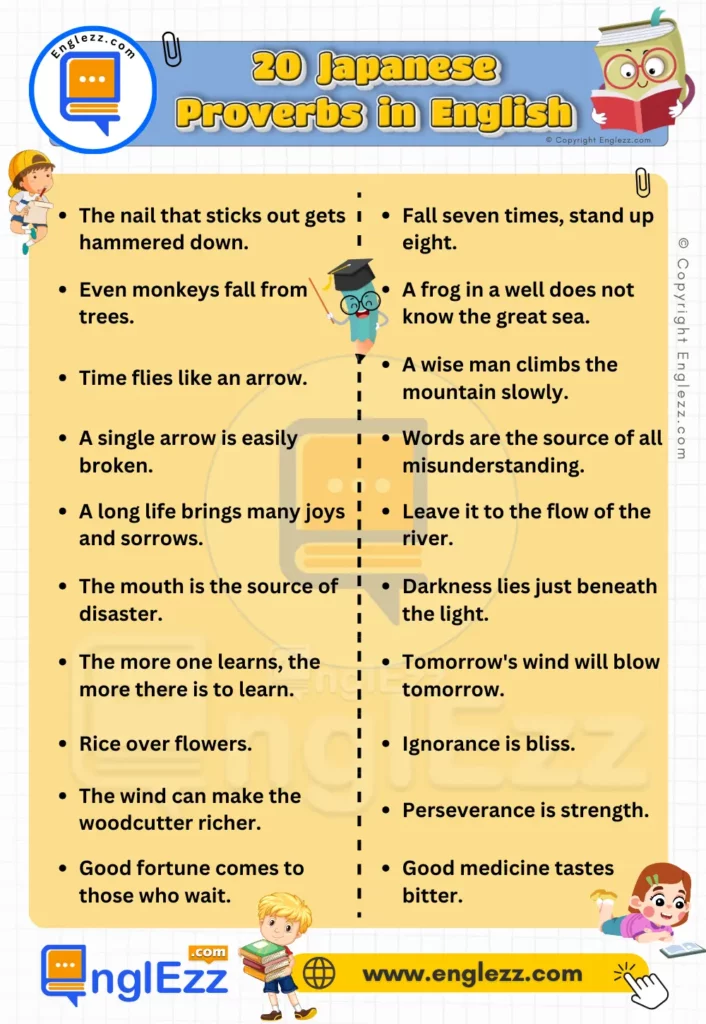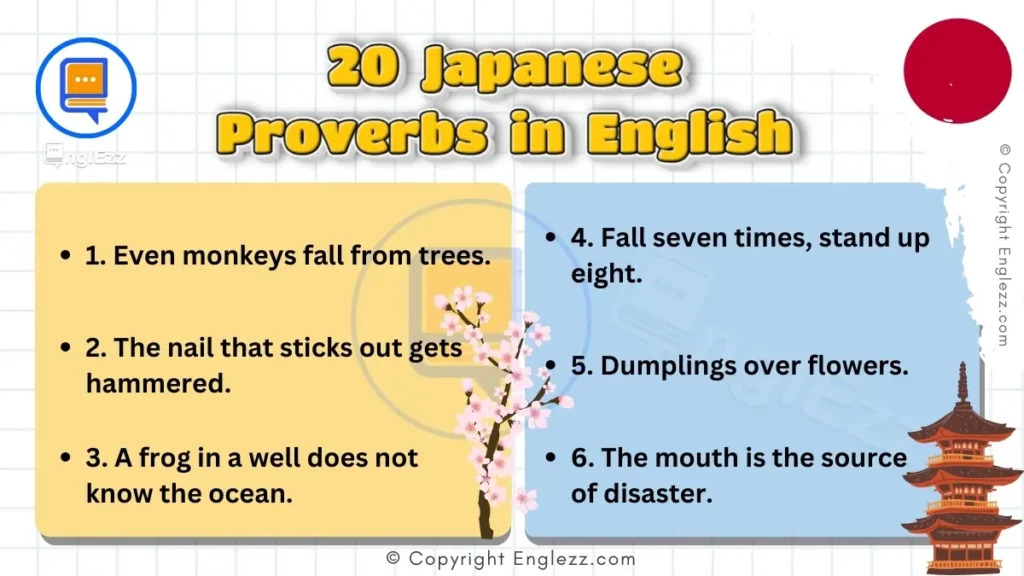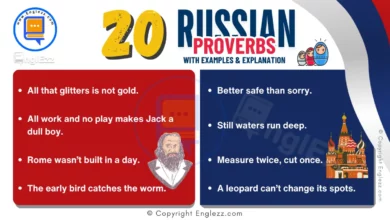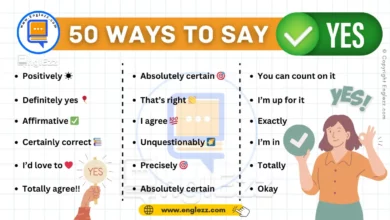Japanese proverbs, or kotowaza (諺), offer profound insights into life, relationships, and human nature. These sayings, steeped in history and culture, encapsulate centuries of wisdom passed down through generations. In this blog post, we’ll explore 20 Japanese proverbs in English, that convey powerful messages.
Each proverb often carries a deep meaning, reflecting the values and beliefs of Japanese society. Whether you are learning Japanese or simply interested in understanding the culture, these proverbs provide a fascinating glimpse into the mindset and traditions of Japan.
Table of Contents
- 20 Timeless Japanese Proverbs in English: Wisdom with Examples
- #1. 🍂 “Kaze ga fuitara okeya ga mōkaru” (風が吹いたら桶屋が儲かる) – When the wind blows, the bucket maker profits
- #2. 🌸 “I no naka no kawazu taikai o shirazu” (井の中の蛙大海を知らず) – A frog in a well does not know the ocean
- #3. 🌾 “Deru kugi wa utareru” (出る釘は打たれる) – The nail that sticks out gets hammered down
- #4. 🍁 “Saru mo ki kara ochiru” (猿も木から落ちる) – Even monkeys fall from trees
- #5. 🍀 “Nanakorobi yaoki” (七転び八起き) – Fall seven times, stand up eight
- #6. 🌻 “Hana yori dango” (花より団子) – Dumplings over flowers
- #7. 🐢 “Isoga ba maware” (急がば回れ) – If you rush, you will go around in circles
- #8. 🌼 “Shinu koto igai wa kizu naoshi” (死ぬこと以外は擦り傷なり) – Everything except death is just a scratch
- #9. 🌱 “Jishin wa motte umare, ki ga wa shire” (自信は持って生まれ、気が知れ) – Confidence comes with birth, but wisdom with time
- #10. 🍃 “Mizu ni nagasu” (水に流す) – Let bygones be bygones
- #11. 🍂 “Chiri mo tsumoreba yama to naru” (塵も積もれば山となる) – Even dust, when piled up, can become a mountain
- #12. 🌺 “Tada yori takai mono wa nai” (ただより高いものはない) – Nothing is more expensive than something free
- #13. 🌸 “Nito o ou mono wa itto o mo ezu” (二兎を追う者は一兎をも得ず) – He who chases two rabbits catches neither
- #14. 🌼 **”Kuchi wa wazawai no moto” (口は
- #15. 🍀 “Shiranu ga hotoke” (知らぬが仏) – Not knowing is Buddha
- #16. 🍁 “Kawa nagare ni mi o makase” (川の流れに身を任せ) – Leave it to the flow of the river
- #17. 🌿 “Tōdai moto kurashi” (灯台下暗し) – It’s dark under the lighthouse
- #18. 🍂 “Kyou no koto wa ashita no kaze ga fuku” (今日のことは明日の風が吹く) – Tomorrow’s wind will blow tomorrow
- #19. 🌻 “Nana korobi ya oki” (七転び八起き) – Fall seven times, stand up eight
- #20. 🌾 “Zan shin” (残心) – Leave a little of your heart behind
- Japanese Proverbs in English Table
- Japanese Proverbs in English Printable
- Conclusion
20 Timeless Japanese Proverbs in English: Wisdom with Examples
Each proverb is accompanied by a phonetic transcription and practical examples to help you understand and apply these timeless sayings in your daily life. As you delve into these proverbs, you’ll find that many of them resonate with universal truths, making them relevant across cultures and languages. Let’s begin our journey into the wisdom of Japan and see how these proverbs can inspire and guide us in various aspects of life.
Explore these proverbs and incorporate them into your daily conversations or use them as a tool for self-reflection. Whether you’re a language enthusiast or a seeker of wisdom, these Japanese proverbs will surely enrich your understanding of life. Don’t forget to check out Englezz Courses and Englezz Research for more resources to expand your knowledge.
#1. 🍂 “Kaze ga fuitara okeya ga mōkaru” (風が吹いたら桶屋が儲かる) – When the wind blows, the bucket maker profits
This proverb highlights the unexpected and indirect consequences of events. It suggests that seemingly unrelated actions or events can lead to surprising outcomes.
Phonetic Transcription: /kaze ga fuitara okeya ga mōkaru/
Examples:
- “A small change in policy might not seem important, but remember, ‘kaze ga fuitara okeya ga mōkaru.'”
- “You never know how things will turn out. Sometimes, ‘kaze ga fuitara okeya ga mōkaru.'”
#2. 🌸 “I no naka no kawazu taikai o shirazu” (井の中の蛙大海を知らず) – A frog in a well does not know the ocean
This proverb warns against narrow-mindedness and encourages broadening one’s perspective.
Phonetic Transcription: /i no naka no kawazu taikai o shirazu/
Examples:
- “Before you judge, remember, ‘i no naka no kawazu taikai o shirazu.’ There’s a lot you might not know.”
- “Traveling opened my eyes; I realized I had been like ‘i no naka no kawazu taikai o shirazu.'”
#3. 🌾 “Deru kugi wa utareru” (出る釘は打たれる) – The nail that sticks out gets hammered down
This saying reflects the importance of conformity in Japanese society, warning that those who stand out may face criticism or pushback.
Phonetic Transcription: /deru kugi wa utareru/
Examples:
- “In the workplace, ‘deru kugi wa utareru,’ so it’s often safer to go with the flow.”
- “She faced backlash for her ideas, a classic case of ‘deru kugi wa utareru.'”
#4. 🍁 “Saru mo ki kara ochiru” (猿も木から落ちる) – Even monkeys fall from trees
No one is perfect, and even the most skilled individuals can make mistakes. This proverb is a reminder that failure is a part of life.
Phonetic Transcription: /saru mo ki kara ochiru/
Examples:
- “Don’t be too hard on yourself; ‘saru mo ki kara ochiru.’ Everyone makes mistakes.”
- “Even the experts can err, as ‘saru mo ki kara ochiru.'”
#5. 🍀 “Nanakorobi yaoki” (七転び八起き) – Fall seven times, stand up eight
This saying emphasizes resilience and perseverance, encouraging individuals to keep going despite setbacks.
Phonetic Transcription: /nanakorobi yaoki/
Examples:
- “Life is tough, but remember, ‘nanakorobi yaoki.’ Keep pushing forward.”
- “After every failure, ‘nanakorobi yaoki’ keeps me motivated to try again.”
#6. 🌻 “Hana yori dango” (花より団子) – Dumplings over flowers
This proverb suggests that practical needs should be prioritized over aesthetic or superficial desires.
Phonetic Transcription: /hana yori dango/
Examples:
- “When it comes to gifts, ‘hana yori dango.’ I’d rather have something useful.”
- “At the festival, I focused on the food – ‘hana yori dango’ all the way.”
#7. 🐢 “Isoga ba maware” (急がば回れ) – If you rush, you will go around in circles
Haste often leads to mistakes, so it’s better to take the time to do things properly.
Phonetic Transcription: /isoga ba maware/
Examples:
- “I learned the hard way that ‘isoga ba maware.’ Taking shortcuts doesn’t pay off.”
- “Patience is key, as ‘isoga ba maware’ reminds us.”
#8. 🌼 “Shinu koto igai wa kizu naoshi” (死ぬこと以外は擦り傷なり) – Everything except death is just a scratch
This saying encourages resilience, suggesting that most problems are minor compared to the gravity of death.
Phonetic Transcription: /shinu koto igai wa kizu naoshi/
Examples:
- “Remember, ‘shinu koto igai wa kizu naoshi.’ Most things can be fixed.”
- “It’s not the end of the world; ‘shinu koto igai wa kizu naoshi.'”

#9. 🌱 “Jishin wa motte umare, ki ga wa shire” (自信は持って生まれ、気が知れ) – Confidence comes with birth, but wisdom with time
Confidence may come naturally, but wisdom is gained through experience.
Phonetic Transcription: /jishin wa motte umare, ki ga wa shire/
Examples:
- “He was confident but lacked experience – ‘jishin wa motte umare, ki ga wa shire.'”
- “Over time, ‘jishin wa motte umare, ki ga wa shire’ became more apparent in my decisions.”
#10. 🍃 “Mizu ni nagasu” (水に流す) – Let bygones be bygones
This proverb advises letting go of past grievances and moving forward.
Phonetic Transcription: /mizu ni nagasu/
Examples:
- “We decided to ‘mizu ni nagasu’ and start fresh.”
- “Holding grudges isn’t healthy – ‘mizu ni nagasu’ is a better approach.”
#11. 🍂 “Chiri mo tsumoreba yama to naru” (塵も積もれば山となる) – Even dust, when piled up, can become a mountain
This saying emphasizes the power of small actions accumulating over time to create something significant.
Phonetic Transcription: /chiri mo tsumoreba yama to naru/
Examples:
- “Saving a little each day may seem insignificant, but ‘chiri mo tsumoreba yama to naru.’
- “Every small effort counts – ‘chiri mo tsumoreba yama to naru.'”
#12. 🌺 “Tada yori takai mono wa nai” (ただより高いものはない) – Nothing is more expensive than something free
This proverb warns that “free” things often come with hidden costs.
Phonetic Transcription: /tada yori takai mono wa nai/
Examples:
- “Be wary of ‘free’ offers – ‘tada yori takai mono wa nai.'”
- “Remember, ‘tada yori takai mono wa nai’ when accepting gifts.”
#13. 🌸 “Nito o ou mono wa itto o mo ezu” (二兎を追う者は一兎をも得ず) – He who chases two rabbits catches neither
Trying to do too many things at once often results in failure to achieve any of them.
Phonetic Transcription: /nito o ou mono wa itto o mo ezu/
Examples:
- “Focus on one task at a time; otherwise, ‘nito o ou mono wa itto o mo ezu.'”
- “He tried to manage both projects, but ‘nito o ou mono wa itto o mo ezu.'”
#14. 🌼 **”Kuchi wa wazawai no moto” (口は
災いの元)** – The mouth is the source of disaster
This proverb advises caution with words, as careless speech can lead to trouble.
Phonetic Transcription: /kuchi wa wazawai no moto/
Examples:
- “Think before you speak – ‘kuchi wa wazawai no moto.'”
- “Her harsh words backfired, proving ‘kuchi wa wazawai no moto.'”
#15. 🍀 “Shiranu ga hotoke” (知らぬが仏) – Not knowing is Buddha
Ignorance can sometimes be bliss, as not knowing certain things can keep you at peace.
Phonetic Transcription: /shiranu ga hotoke/
Examples:
- “Sometimes, ‘shiranu ga hotoke.’ It’s better not to know everything.”
- “He chose to stay uninformed, believing ‘shiranu ga hotoke.'”
#16. 🍁 “Kawa nagare ni mi o makase” (川の流れに身を任せ) – Leave it to the flow of the river
This saying encourages going with the flow and accepting things as they come.
Phonetic Transcription: /kawa nagare ni mi o makase/
Examples:
- “When life gets tough, I try to ‘kawa nagare ni mi o makase.'”
- “Sometimes, it’s best to ‘kawa nagare ni mi o makase’ and see where life takes you.”
#17. 🌿 “Tōdai moto kurashi” (灯台下暗し) – It’s dark under the lighthouse
This proverb suggests that people often overlook what is right in front of them.
Phonetic Transcription: /tōdai moto kurashi/
Examples:
- “I searched everywhere for my keys, but ‘tōdai moto kurashi’ – they were right there.”
- “Sometimes, ‘tōdai moto kurashi.’ The answers are closer than you think.”
#18. 🍂 “Kyou no koto wa ashita no kaze ga fuku” (今日のことは明日の風が吹く) – Tomorrow’s wind will blow tomorrow
This proverb encourages focusing on today rather than worrying about the future.
Phonetic Transcription: /kyou no koto wa ashita no kaze ga fuku/
Examples:
- “Why stress? ‘Kyou no koto wa ashita no kaze ga fuku.’ Focus on today.”
- “He lives by ‘kyou no koto wa ashita no kaze ga fuku,’ taking each day as it comes.”
#19. 🌻 “Nana korobi ya oki” (七転び八起き) – Fall seven times, stand up eight
This saying encourages resilience, urging people to keep trying even after multiple failures.
Phonetic Transcription: /nana korobi ya oki/
Examples:
- No matter how many times you fall, ‘nana korobi ya oki’ – keep getting back up.
- “His journey was tough, but ‘nana korobi ya oki’ kept him going.”
#20. 🌾 “Zan shin” (残心) – Leave a little of your heart behind
This saying reminds people to always leave a positive impression and to care for others, even after they’ve left.
Phonetic Transcription: /zan shin/
Examples:
- He always practices ‘zan shin,’ making sure his deeds leave a positive impact.”
- Even after parting ways, ‘zan shin’ guided her to act kindly.
Japanese Proverbs in English Table
| 1. Even monkeys fall from trees. | 11. Nothing is more expensive than something free. |
| 2. The nail that sticks out gets hammered. | 12. He who chases two rabbits catches neither. |
| 3. A frog in a well does not know the ocean. | 13. The mouth is the source of disaster. |
| 4. Fall seven times, stand up eight. | 14. Not knowing is Buddha. |
| 5. Dumplings over flowers. | 15. Leave it to the flow of the river. |
| 6. The mouth is the source of disaster. | 16. It’s dark under the lighthouse. |
| 7. If you rush, you will go around in circles. | 17. Tomorrow’s wind will blow tomorrow. |
| 8. Let bygones be bygones. | 18. Fall seven times, stand up eight. |
| 9. Even dust, when piled up, can become a mountain. | 19. Leave a little of your heart behind. |
| 10. Confidence comes with birth, but wisdom with time. | 20. Even monkeys fall from trees. |
Japanese Proverbs in English Printable

Conclusion
Japanese proverbs offer a window into the culture and wisdom of Japan. They encapsulate life lessons that transcend time and geography, making them relevant even today. From encouraging perseverance to advising caution, these proverbs provide valuable insights that can guide us in various aspects of life.
By learning these proverbs, you not only gain a deeper understanding of Japanese culture but also enrich your own life with universal truths that resonate across cultures.
Whether you’re looking to improve your language skills, gain cultural insights, or simply enjoy the beauty of language, these proverbs serve as a powerful tool. They remind us that wisdom often comes in small, simple packages, and that the lessons they impart are timeless.
If you’re interested in exploring more about the Japanese language and culture, consider enrolling in Englezz Courses or delving deeper into Englezz Research. By doing so, you’ll continue your journey of discovery, gaining knowledge that can inspire and inform your daily life.
Don’t forget to explore Englezz for more language learning materials and tools to help you on your journey.









🌟 Dive into the wisdom of Japanese culture with these timeless proverbs! 😊 Explore their meanings and enrich your language skills at Englezz 🌸. Don’t forget to like and follow EnglEzz for more enlightening content!
.
https://www.englezz.com/20-timeless-japanese-proverbs-in-english/
#englezz #JapaneseProverbs #LanguageLearning #CulturalWisdom #LanguageQuotes #LearningJapanese #JapaneseCulture